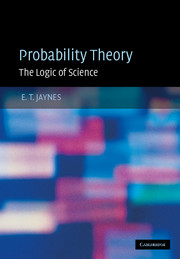Book contents
- Frontmatter
- Contents
- Editor's foreword
- Preface
- Part I Principles and elementary applications
- Part II Advanced applications
- 11 Discrete prior probabilities: the entropy principle
- 12 Ignorance priors and transformation groups
- 13 Decision theory, historical background
- 14 Simple applications of decision theory
- 15 Paradoxes of probability theory
- 16 Orthodox methods: historical background
- 17 Principles and pathology of orthodox statistics
- 18 The Ap distribution and rule of succession
- 19 Physical measurements
- 20 Model comparison
- 21 Outliers and robustness
- 22 Introduction to communication theory
- Appendix A Other approaches to probability theory
- Appendix B Mathematical formalities and style
- Appendix C Convolutions and cumulants
- References
- Bibliography
- Author index
- Subject index
12 - Ignorance priors and transformation groups
from Part II - Advanced applications
Published online by Cambridge University Press: 05 September 2012
- Frontmatter
- Contents
- Editor's foreword
- Preface
- Part I Principles and elementary applications
- Part II Advanced applications
- 11 Discrete prior probabilities: the entropy principle
- 12 Ignorance priors and transformation groups
- 13 Decision theory, historical background
- 14 Simple applications of decision theory
- 15 Paradoxes of probability theory
- 16 Orthodox methods: historical background
- 17 Principles and pathology of orthodox statistics
- 18 The Ap distribution and rule of succession
- 19 Physical measurements
- 20 Model comparison
- 21 Outliers and robustness
- 22 Introduction to communication theory
- Appendix A Other approaches to probability theory
- Appendix B Mathematical formalities and style
- Appendix C Convolutions and cumulants
- References
- Bibliography
- Author index
- Subject index
Summary
Ignorance is preferable to error and he is less remote from the truth who believes nothing than he who believes what is wrong.
Thomas Jefferson (1781)The problem of translating prior information uniquely into a prior probability assignment represents the as yet unfinished half of probability theory, though the principle of maximum entropy in the preceding chapter provides one important tool. It is unfinished because it has been rejected for many decades by those who were unable to conceive of a probability distribution as representing information; but, just because of that long neglect, many current scientific, engineering, economic, and environmental problems are today calling out for new solutions to this problem, without which important new applications cannot proceed.
What are we trying to do?
It is curious that, even when different workers are in substantially complete agreement on what calculations should be done, they may have radically different views as to what we are actually doing and why we are doing it. For example, there is a large Bayesian community, whose members call themselves ‘subjective Bayesians’, who have settled into a position intermediate between ‘orthodox’ statistics and the theory expounded here. Their members have had, for the most part, standard orthodox training; but then they saw the absurdities in it and defected from the orthodox philosophy, while retaining the habits of orthodox terminology and notation.
- Type
- Chapter
- Information
- Probability TheoryThe Logic of Science, pp. 372 - 396Publisher: Cambridge University PressPrint publication year: 2003
- 1
- Cited by



